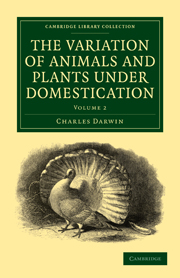Book contents
- Frontmatter
- Contents
- CHAPTER XII INHERITANCE
- CHAPTER XIII INHERITANCE continued – REVERSION OR ATAVISM
- CHAPTER XIV INHERITANCE continued – FIXEDNESS OF CHARACTER – PREPOTENCY – SEXUAL LIMITATION – CORRESPONDENCE OF AGE
- CHAPTER XV ON CROSSING
- CHAPTER XVI CAUSES WHICH INTERFERE WITH THE FREE CROSSING OF VARIETIES – INFLUENCE OF DOMESTICATION ON FERTILITY
- CHAPTER XVII ON THE GOOD EFFECTS OF CROSSING, AND ON THE EVIL EFFECTS OF CLOSE INTERBREEDING
- CHAPTER XVIII ON THE ADVANTAGES AND DISADVANTAGES OF CHANGED CONDITIONS OF LIFE: STERILITY FROM VARIOUS CAUSES
- CHAPTER XIX SUMMARY OF THE FOUR LAST CHAPTERS, WITH REMARKS ON HYBRIDISM
- CHAPTER XX SELECTION BY MAN
- CHAPTER XXI SELECTION–continued
- CHAPTER XXII CAUSES OF VARIABILITY
- CHAPTER XXIII DIRECT AND DEFINITE ACTION OF THE EXTERNAL CONDITIONS OF LIFE
- CHAPTER XXIV LAWS OF VARIATION – USE AND DISUSE, ETC
- CHAPTER XXV LAWS OF VARIATION, continued – CORRELATED VARIABILITY
- CHAPTER XXVI LAWS OF VARIATION, continued – SUMMARY
- CHAPTER XXVII PROVISIONAL HYPOTHESIS OF PANGENESIS
- CHAPTER XXVIII CONCLUDING REMARKS
- INDEX
CHAPTER XIV - INHERITANCE continued – FIXEDNESS OF CHARACTER – PREPOTENCY – SEXUAL LIMITATION – CORRESPONDENCE OF AGE
Published online by Cambridge University Press: 05 July 2011
- Frontmatter
- Contents
- CHAPTER XII INHERITANCE
- CHAPTER XIII INHERITANCE continued – REVERSION OR ATAVISM
- CHAPTER XIV INHERITANCE continued – FIXEDNESS OF CHARACTER – PREPOTENCY – SEXUAL LIMITATION – CORRESPONDENCE OF AGE
- CHAPTER XV ON CROSSING
- CHAPTER XVI CAUSES WHICH INTERFERE WITH THE FREE CROSSING OF VARIETIES – INFLUENCE OF DOMESTICATION ON FERTILITY
- CHAPTER XVII ON THE GOOD EFFECTS OF CROSSING, AND ON THE EVIL EFFECTS OF CLOSE INTERBREEDING
- CHAPTER XVIII ON THE ADVANTAGES AND DISADVANTAGES OF CHANGED CONDITIONS OF LIFE: STERILITY FROM VARIOUS CAUSES
- CHAPTER XIX SUMMARY OF THE FOUR LAST CHAPTERS, WITH REMARKS ON HYBRIDISM
- CHAPTER XX SELECTION BY MAN
- CHAPTER XXI SELECTION–continued
- CHAPTER XXII CAUSES OF VARIABILITY
- CHAPTER XXIII DIRECT AND DEFINITE ACTION OF THE EXTERNAL CONDITIONS OF LIFE
- CHAPTER XXIV LAWS OF VARIATION – USE AND DISUSE, ETC
- CHAPTER XXV LAWS OF VARIATION, continued – CORRELATED VARIABILITY
- CHAPTER XXVI LAWS OF VARIATION, continued – SUMMARY
- CHAPTER XXVII PROVISIONAL HYPOTHESIS OF PANGENESIS
- CHAPTER XXVIII CONCLUDING REMARKS
- INDEX
Summary
In the two last chapters the nature and force of Inheritance, the circumstances which interfere with its power, and the tendency to Reversion, with its many remarkable contingencies, were discussed. In the present chapter some other related phenomena will be treated of, as fully as my materials permit.
Fixedness of Character
It is a general belief amongst breeders that the longer any character has been transmitted by a breed, the more firmly it will continue to be transmitted. I do not wish to dispute the truth of the proposition, that inheritance gains strength simply through long continuance, but I doubt whether it can be proved. In one sense the proposition is little better than a truism; if any character has remained constant during many generations, it will obviously be little likely, the conditions of life remaining the same, to vary during the next generation. So, again, in improving a breed, if care be taken for a length of time to exclude all inferior individuals, the breed will obviously tend to become truer, as it will not have been crossed during many generations by an inferior animal. We have previously seen, but without being able to assign any cause, that, when a new character appears, it is occasionally from the first well fixed, or fluctuates much, or wholly fails to be transmitted. So it is with the aggregate of slight differences which characterise a new variety, for some propagate their kind from the first much truer than others.
- Type
- Chapter
- Information
- The Variation of Animals and Plants under Domestication , pp. 62 - 84Publisher: Cambridge University PressPrint publication year: 2010First published in: 1868



